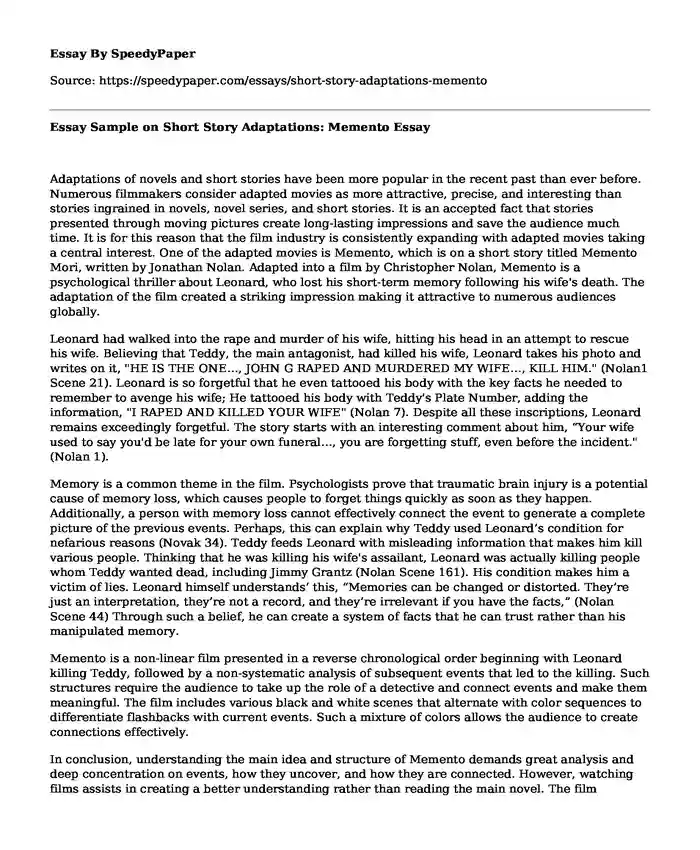Adaptations of novels and short stories have been more popular in the recent past than ever before. Numerous filmmakers consider adapted movies as more attractive, precise, and interesting than stories ingrained in novels, novel series, and short stories. It is an accepted fact that stories presented through moving pictures create long-lasting impressions and save the audience much time. It is for this reason that the film industry is consistently expanding with adapted movies taking a central interest. One of the adapted movies is Memento, which is on a short story titled Memento Mori, written by Jonathan Nolan. Adapted into a film by Christopher Nolan, Memento is a psychological thriller about Leonard, who lost his short-term memory following his wife's death. The adaptation of the film created a striking impression making it attractive to numerous audiences globally.
Leonard had walked into the rape and murder of his wife, hitting his head in an attempt to rescue his wife. Believing that Teddy, the main antagonist, had killed his wife, Leonard takes his photo and writes on it, "HE IS THE ONE…, JOHN G RAPED AND MURDERED MY WIFE…, KILL HIM." (Nolan1 Scene 21). Leonard is so forgetful that he even tattooed his body with the key facts he needed to remember to avenge his wife; He tattooed his body with Teddy's Plate Number, adding the information, "I RAPED AND KILLED YOUR WIFE" (Nolan 7). Despite all these inscriptions, Leonard remains exceedingly forgetful. The story starts with an interesting comment about him, “Your wife used to say you'd be late for your own funeral…, you are forgetting stuff, even before the incident." (Nolan 1).
Memory is a common theme in the film. Psychologists prove that traumatic brain injury is a potential cause of memory loss, which causes people to forget things quickly as soon as they happen. Additionally, a person with memory loss cannot effectively connect the event to generate a complete picture of the previous events. Perhaps, this can explain why Teddy used Leonard’s condition for nefarious reasons (Novak 34). Teddy feeds Leonard with misleading information that makes him kill various people. Thinking that he was killing his wife's assailant, Leonard was actually killing people whom Teddy wanted dead, including Jimmy Grantz (Nolan Scene 161). His condition makes him a victim of lies. Leonard himself understands’ this, “Memories can be changed or distorted. They’re just an interpretation, they’re not a record, and they’re irrelevant if you have the facts,” (Nolan Scene 44) Through such a belief, he can create a system of facts that he can trust rather than his manipulated memory.
Memento is a non-linear film presented in a reverse chronological order beginning with Leonard killing Teddy, followed by a non-systematic analysis of subsequent events that led to the killing. Such structures require the audience to take up the role of a detective and connect events and make them meaningful. The film includes various black and white scenes that alternate with color sequences to differentiate flashbacks with current events. Such a mixture of colors allows the audience to create connections effectively.
In conclusion, understanding the main idea and structure of Memento demands great analysis and deep concentration on events, how they uncover, and how they are connected. However, watching films assists in creating a better understanding rather than reading the main novel. The film director, Christopher Nolan, effectively connects events and uses distinct colors to creates hints that would allow the audience to effectively connect various events despite the reverse chronological order. In essence, the adapted film was critical in simplifying the short story and making it more attractive to the audiences.
Works Cited
Nolan, Christopher. "Watch Memento Online Free Watch Movies Online Free." YouTube, 2 July, 2016, www.youtube.com/watch?v=nens3ZY-F3g.
Nolan, Jonathan. Memento & Following. Macmillan, 2001.
Novak. "It's Like Waking": Making Meaning in and of Christopher Nolan's Memento." Journal of Film and Video, vol. 71, no. 4, 2019, pp. 29-50.
Rydon-Grange, Michelle, and Rudi Coetzer. "Association between cognitive impairments and obsessive-compulsive spectrum presentations following traumatic brain injury." Neuropsychological Rehabilitation, vol. 29, no. 2, 2017, pp. 214-231.
Cite this page
Essay Sample on Short Story Adaptations: Memento. (2023, Sep 26). Retrieved from https://speedypaper.net/essays/short-story-adaptations-memento
Request Removal
If you are the original author of this essay and no longer wish to have it published on the SpeedyPaper website, please click below to request its removal:
- Statistics Essay Sample with Analysis SPSS
- Essay Sample on Waiting for Superman Movie
- Paper Example: Leading Diverse Team
- Free Essay Example: Media Censorship
- Essay Example: Achieved and Projected Expenses and Revenues
- Video Games for Well-Being - Essay Example
- What Movies Tell Us About The Causes of Crime - Free Paper Sample
Popular categories





